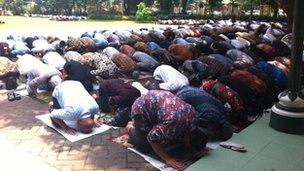Indonesia's pious Muslims boost Islamic finance
- Published
Islamic finance has become a force to be reckoned with in the world of commercial banking, Karishma Vaswani reports from Jakarta.
Nurhidayati is an enterprising businesswoman. The 28-year-old has been running a garment company with her husband Endri, making clothes for the Indonesian army for the past few years.
It's a lucrative contract, but one that requires large upfront capital in order for her to expand.
But borrowing money from a commercial bank just did not sit well with her.
"I needed cash for my business and for a new house that we wanted to buy," the devout young Muslim told me at the central Jakarta branch of Islamic bank, Bank Jabar Banten Syariah, as she adjusted her bright pink headscarf.
"But I've always been taught to avoid bank interest because it is forbidden in Islam. The other good thing about Islamic banks is that no matter how small your deposit, your money won't be reduced by bank charges."
Nurhidayati and her husband are among the Indonesian Islamic finance customers that have helped this industry grow by 40% a year.
Piety
Indonesia is the world's most populous Muslim nation, with close to 90% of the 250 million population Muslim.
Although the country is secular, Islam plays a big role in daily life. Analysts say over the last few years there has been a marked increase in the piety of Indonesian Muslims.
This has been reflected, they say, in the way people dress, how much more regularly they go to the mosque - even in the way they choose to bank.
This increased piousness has led to a demand for the services of Islamic or Sharia banks in Indonesia.
Islamic or Sharia banks are financial institutions that are consistent with the principles of Islamic or Sharia.
That means you aren't allowed to accept interest or charge fees on loans, and that you can only invest in businesses that are not considered sinful.
The practice only started in Indonesia about a decade ago and has been competing with the more traditional forms of commercial banking.
'Huge potential'
"We're very satisfied with the growth of Islamic banking in Indonesia - it is growing by 40% a year," Riawan Amin, the head of Indonesia's Islamic Banking Association told me.

There are more Muslims in Indonesia than anywhere else in the world
"But as a country that claims to be one of the biggest Muslim nations, the market share that Islamic banks have is only 4% of the total banking system," he added.
"That's still very small. The conventional banking system has been around for more than 100 years in Indonesia.
"The country is so big so you need a lot of branches to have a presence here. And up till now Islamic banks only have about 1,500 branches in the country in comparison to the tens of thousands that other banks have. But the potential here is huge."
Foreign money
Islamic banking insists on ethical investments, which is why solar power projects - considered "green investments" - can raise huge amounts of money through Islamic finance.
The Australian-based power firm, the Solar Guys, plans on building five solar-powered stations across the Indonesian archipelago.
It has already secured a memorandum of understanding with the Indonesian government and is in the process of talking to provincial governments.
The company has also raised all the money it says it needs for the project - $500m (£310m; 383m euros) - all through Islamic finance.
But the money is coming from Malaysia and the Middle East - not Indonesia.
Growth
"Malaysia has already developed their Islamic finance industry for some time now," M Rusydi, an Islamic financial consultant with the Solar Guys told me.
"They haven't just focused on the retail banking side of the business - but they've also focused on the corporate and commercial sectors, infrastructure and project development.
"Judging from their experience we thought it made sense to structure our Islamic Sukuk bond and issue it in Malaysia."
Experts say Indonesia is poised to see a huge boom in Islamic banking.
Many banks who have ventured into this industry have seen spectacular growth over the last few years.
But critics say that in order for Islamic finance to truly take off in the world's most populous Muslim nation, the government needs to do more to encourage the maturing of this industry.